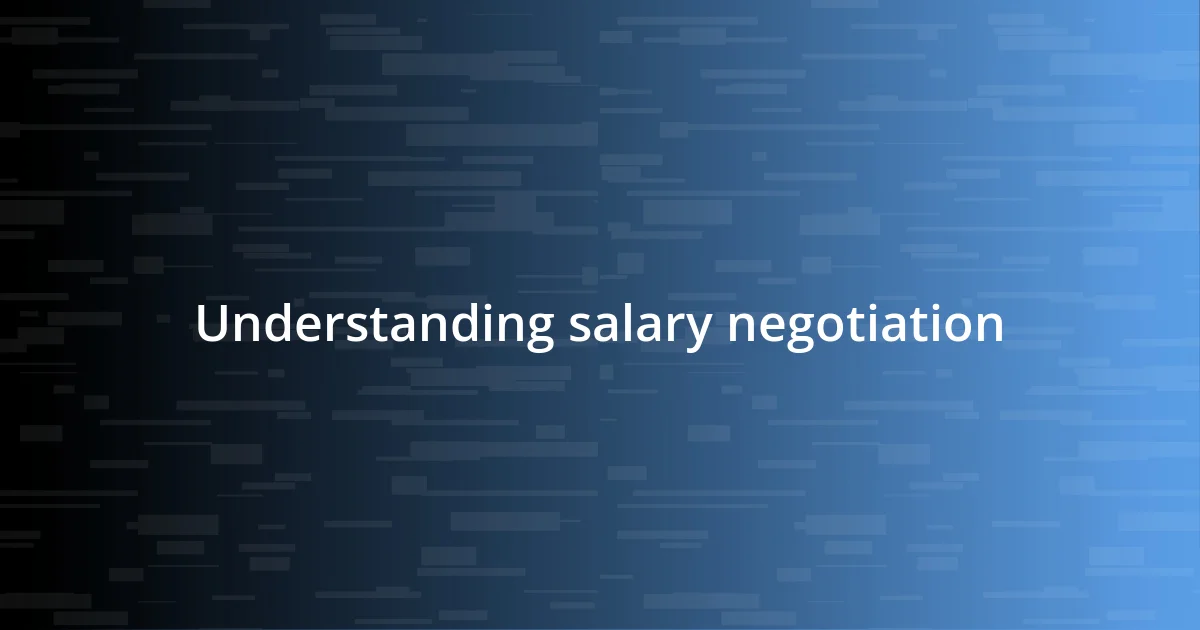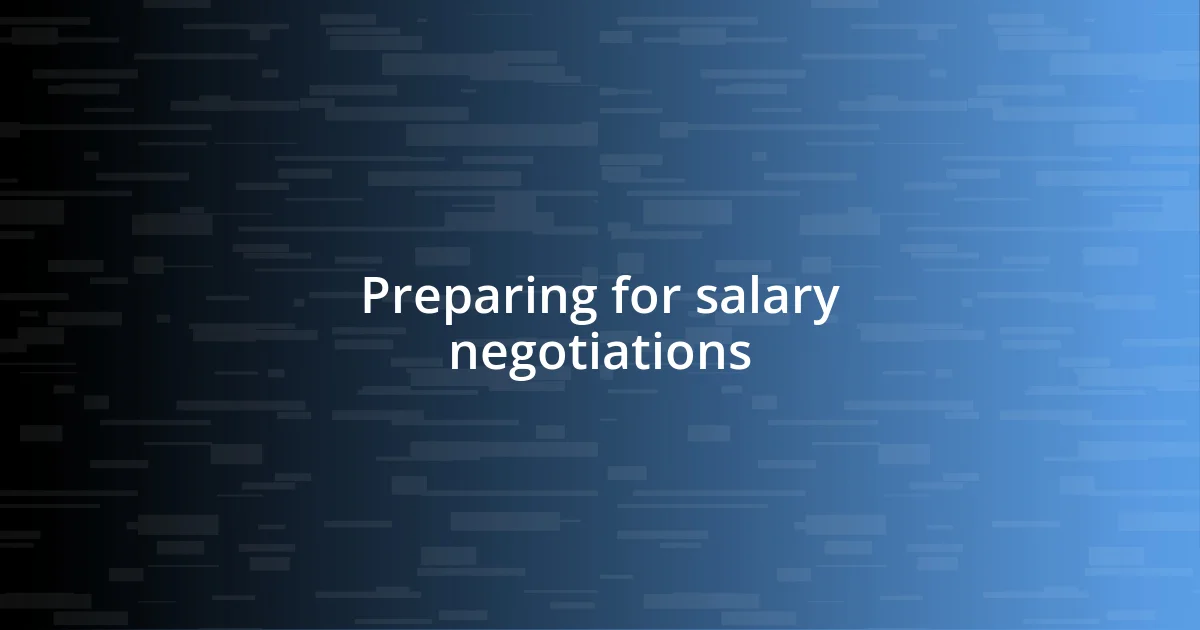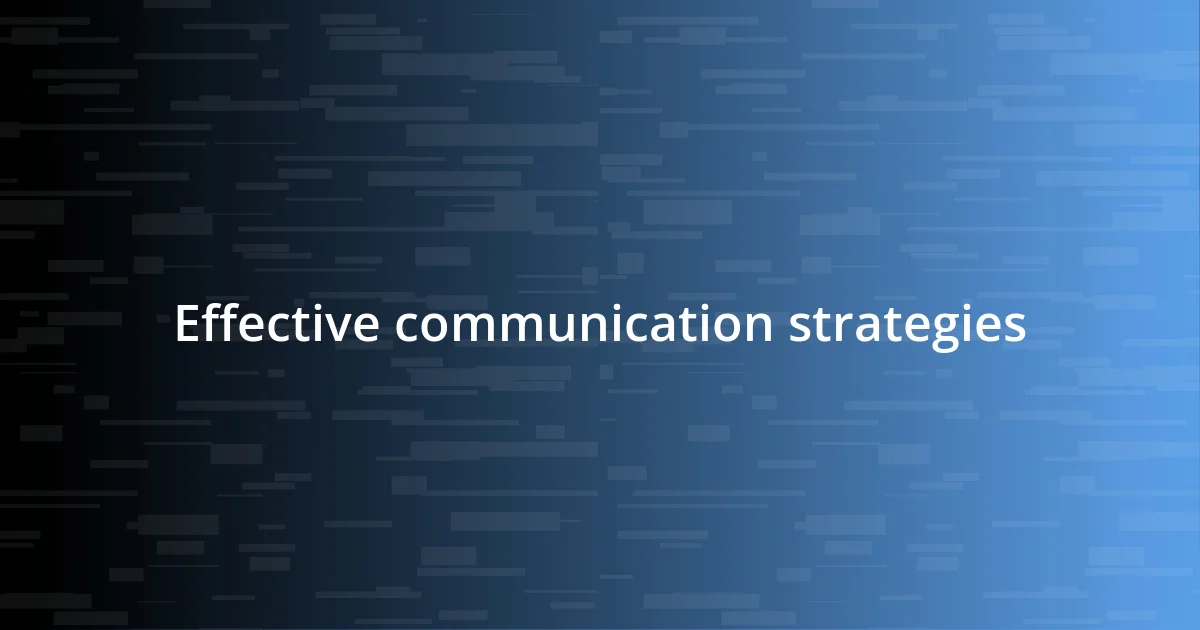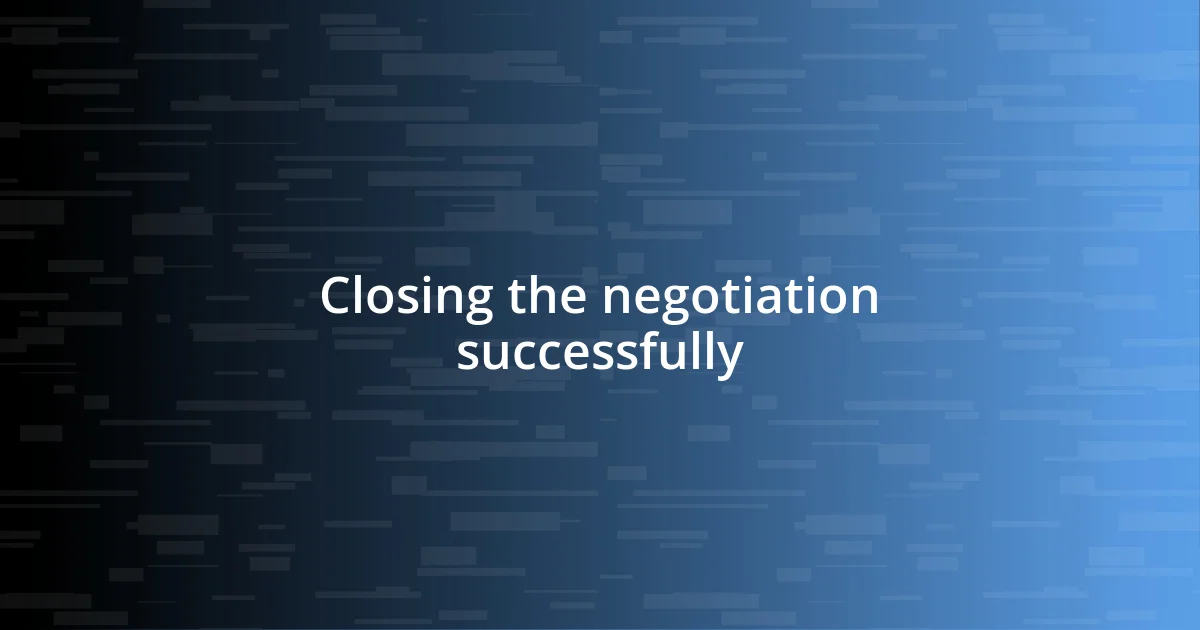Key takeaways:
- Understanding your market worth and preparing with data boosts confidence during salary negotiations.
- Effective communication and emotional intelligence, including storytelling and active listening, enhance negotiation outcomes.
- Following up after negotiations reinforces interest, clarifies details, and reflects on personal growth, strengthening professional relationships.

Understanding salary negotiation
Understanding salary negotiation is often more about strategy than simply demanding a higher paycheck. I remember a time when I hesitated to ask for an increase, believing my performance alone would speak volumes. How many of us have been in that situation, assuming our hard work is enough? It was a wake-up call when I realized that negotiations are as much about communicating your value as they are about numbers.
Effective negotiation isn’t solely about exchanging figures; it involves understanding your worth in the marketplace. When I finally researched industry standards before my next discussion, I felt empowered. I knew my experience and skills were aligned with a competitive salary. Isn’t it fascinating how being informed can transform our approach? That knowledge turned my anxiety into confidence.
Moreover, emotional intelligence plays a crucial role in the negotiation process. I recall a conversation with a hiring manager who responded positively when I expressed my passion for the role—not just my need for a better salary. It struck me that connecting on a personal level helps build rapport. How often do we forget that? Emphasizing our genuine interest can lead to more favorable outcomes beyond just numbers.

Preparing for salary negotiations
Preparing for salary negotiations involves several key steps that can significantly impact the outcome. First, you want to research the market rate for your position, which I learned the hard way during my first negotiation. I entered the room feeling unsure, but once I armed myself with data from salary surveys, I felt more grounded. This preparation allowed me to discuss my expectations confidently, as I knew I could back them up with concrete information.
Another critical aspect is practice. I vividly remember rehearsing my points with a friend before one particular negotiation. It not only made me articulate my achievements but also helped me anticipate potential counterarguments. Practicing makes a world of difference. I was surprised to discover how much more relaxed I felt when the time came to actually have the discussion.
Lastly, I believe in establishing clear goals for the conversation. I often jot down specific outcomes I hope to achieve, whether that’s a salary figure, benefits, or opportunities for future growth. It might sound like a simple step, but clarifying my aspirations ensures I’m focused during the negotiation. In my experience, knowing exactly what I wanted helped me steer the conversation in a productive direction.
| Preparation Step | Description |
|---|---|
| Research | Understand market salary ranges and data |
| Practice | Role-play your negotiation to build confidence |
| Set Goals | Define specific outcomes you want to achieve |

Researching salary benchmarks
When I approached my last salary negotiation, I realized that researching salary benchmarks was absolutely crucial. I took the time to explore various resources, collecting data on average salaries for my position in my industry and geographical area. Honestly, it surprised me to find how much variation there was. Equipped with this knowledge, I felt I had the upper hand. For instance, understanding the difference in pay ranges among companies helped me articulate my worth better and encouraged me to push for a figure that reflected my skills and experience.
To assist you in your research endeavors, here’s a concise bullet list of effective resources:
- Online Salary Surveys: Websites like Glassdoor and PayScale provide detailed salary information based on job titles and locations.
- Professional Associations: Many industries have associations that publish annual salary reports for their members.
- Job Boards: Listings on sites such as Indeed often indicate salary ranges.
- Networking Conversations: Engaging with peers can provide candid insights about their compensation and industry standards.
- Company Reports: If you’re considering a company, sometimes they publish salary information or ranges in their job postings.
I remember discussing salary benchmarks with a colleague who had a wealth of knowledge from her own research. She shared both data and stories—her findings made a tangible difference in our confidence levels during negotiations. It felt empowering to walk into a meeting knowing that our expectations were aligned with real market conditions. Trust me, taking the time to gather this information is worth it.

Effective communication strategies
Effective communication during salary negotiations goes beyond just articulating numbers; it’s about conveying confidence and relatability. I remember walking into a negotiation where I had to discuss not just the salary but also the incredible support my team provided during a critical project. By sharing specific examples, I painted a picture of my contributions, which made it easier for the manager to see the value I brought to the table. Have you ever noticed how stories can evoke emotions and create a connection? That personal narrative can dissolve tension and build a rapport, something I found immensely beneficial.
Listening plays an equally vital role in effective communication. During one of my negotiations, I made a conscious effort to listen closely to my employer’s concerns. This active listening enabled me to respond thoughtfully rather than react impulsively. It’s like a dance; when you pay attention to your partner, the rhythm flows much smoother. I found that asking clarifying questions not only showed my genuine interest but also prompted a more open dialogue, ultimately leading to a more productive conversation.
Finally, body language can’t be underestimated. I’ll never forget a negotiation where I consciously focused on maintaining eye contact and mirroring my counterpart’s posture. I believe this subtle cue can convey confidence and create a sense of partnership. Have you ever noticed how much more engaged you feel when someone is truly present in a conversation? By being aware of these non-verbal signals, we can enhance our overall message and foster a collaborative atmosphere, making negotiation feel less like a battle and more like a mutual discussion.

Handling counteroffers and objections
When you receive a counteroffer, it can feel like a win, but it’s crucial to pause and evaluate the entire package. I remember feeling a rush of excitement when a company made me a generous counteroffer. However, I took a step back to assess not just the salary but also benefits, work-life balance, and growth potential. It made me realize that a higher salary alone doesn’t guarantee job satisfaction. Have you ever settled for a figure only to regret it later? It’s important to see the bigger picture.
Objections can be daunting, but I’ve learned to embrace them as opportunities for dialogue. During one negotiation, my employer raised concerns about budget constraints. Instead of becoming defensive, I used that moment to explore alternative compensation options—like performance bonuses or additional vacation days. I found that suggesting creative alternatives opened up new avenues for discussion, often leading to compromises that satisfied both parties. How might you turn objections into platforms for collaboration?
It’s easy to get caught up in the moment and feel pressured to accept an offer quickly. In one of my experiences, I realized the power of taking a moment to gather my thoughts. I told the hiring manager I needed a few days to consider the offer. This not only gave me time to reflect but also showed them I was serious about making a well-informed decision. Sometimes, just giving yourself space can lead to insights you might overlook otherwise, don’t you think?

Closing the negotiation successfully
Closing a salary negotiation successfully hinges on clarity and mutual understanding. I remember sitting across from my potential employer, feeling a wave of nerves as we were nearing the end. Instead of rushing to accept the offer, I asked for a summary of the key points we discussed, which not only clarified the details but also left me feeling more in control. Have you ever found that reviewing points can empower you in a conversation?
Another critical element is expressing gratitude, regardless of the outcome. After one intense negotiation, where I felt the stakes were high, I smiled and thanked the hiring manager for their time and consideration. Even though we didn’t reach my target salary, that small act of appreciation opened doors for future conversations. It’s fascinating how a simple “thank you” can resonate deeply, isn’t it?
Finally, don’t shy away from asking for time to consider the offer. I vividly recall a moment where a generous offer was presented, but I wasn’t ready to make a snap decision. By asking for 48 hours, I not only allowed myself time to reflect but also demonstrated that I was weighing this major decision seriously. I’ve learned that taking a moment can reveal insights that might have easily slipped through the cracks. Why rush when this decision can impact your life so significantly?

Following up after negotiations
Following up after negotiations is a crucial step that often gets overlooked. I recall sending a follow-up email just a day after a salary discussion where I emphasized my enthusiasm for the role and gratitude for the opportunity. This simple act not only reiterated my interest but also kept the lines of communication open. Have you ever thought about how a small gesture can make a big difference in your professional relationships?
One thing I’ve learned is that following up isn’t just about securing an offer; it’s also a chance to clarify any lingering questions. In one instance, after a negotiation, I sent a note asking for clarification on the benefits package that had been briefly mentioned. This not only provided me more detail but made the hiring manager appreciate my proactive approach. How often do we miss opportunities just because we hesitate to ask?
Finally, I always take the time to reflect on what I’ve learned from the negotiation process in my follow-up. After one particular negotiation, I noted areas where my proposal could improve. Sharing these insights in my follow-up email highlighted my commitment to growth and learning. Isn’t it empowering to showcase your developmental journey even in a follow-up?














